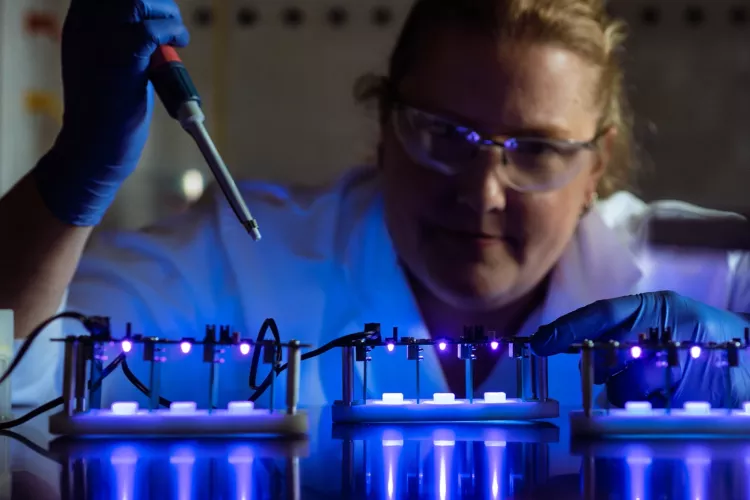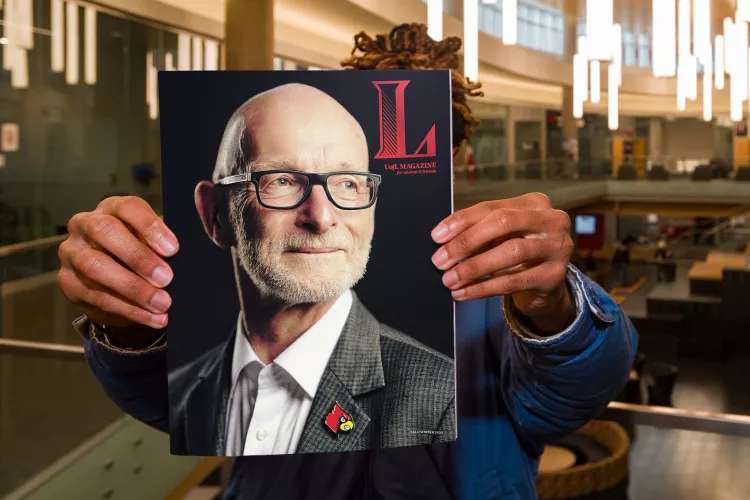Knights Templar Eye Foundation grant supports UofL research for improved retinoblastoma treatment
October 2, 2024UofL researchers Aparna Ramasubramanian, MD, and Jill Steinbach-Rankins, PhD, have received a grant from the Knights Templar Eye Foundation Inc., to support their work in developing an improved chemotherapy treatment for retinoblastoma. Ramasubramanian, a pediatric ophthalmologist and ocular oncologist, and Steinbach-Rankins, a professor of bioengineering at the UofL J.B. Speed School of Engineering, are developing nanoparticles that will encapsulate the drug melphalan for use in intravitreal injections in the treatment of retinoblastoma.
Retinoblastoma is the most common type of eye cancer in children. Each year, approximately 300 children, usually under the age of 5, are diagnosed with retinoblastoma in the United States. The cancer begins in the retina, the layer of nerve tissue lining the inside of the back of the eye.
Melphalan is the most commonly used chemotherapy drug for intraocular injection in retinoblastoma. It is delivered into the vitreous cavity of the eye with the patient under general anesthesia. Since the drug degrades quickly, four to 12 injections may be required to control the tumor. Injection into an eye with an active tumor poses the risk of allowing the cancer to spread to other areas of the body, and with repeated injections, toxicity in the retina and the rate of complications increases.
Ramasubramanian and Steinbach-Rankins are developing a method for encapsulating melphalan using nanoparticles that will allow the medication to remain viable longer, reducing the number of injections needed and thereby minimizing the side effects and need for anesthesia.
“Typically the treatment requires six to eight injections. If we can reduce that number by even half, it would greatly reduce the risks associated with the treatment,” said Ramasubramanian, who specializes in the treatment of eye cancers.
They hope to have a version of the medication available for clinical trials within two years.
"Blindness from ocular retinoblastoma is a tragic occurrence but new treatments can prevent loss of vision and loss of life. Unfortunately, treatment can sometimes have significant adverse effects throughout the body,” said Henry Kaplan, MD, chair of the UofL Department of Ophthalmology and Visual Sciences. “The ability to deliver effective anti-tumor medications in small particles (nanoparticles) directly into the eye should avoid this problem and allow a much easier treatment course for patients."
The Knights Templar Eye Foundation Inc., incorporated in 1956, is a charity sponsored by the Grand Encampment of Knights Templar based in Flower Mound, Texas. Since 2010, the organization’s mission has been to improve vision through research, education, and supporting access to care.
“The Knights Templar Eye Foundation offers grants of $65,000 to researchers who are doing work in the field of eye research,” said Larry Carte, the deputy grand commander of the Knights Templar of Kentucky, who presented the check on June 24. “The work Dr. Ramasubramanian is doing here is very important and they are pleased to offer her the grant to support her research.”
Ramasubramanian will have the option to apply for an additional grant next year if the project is not complete. The Knights Templar Eye Foundation has awarded research grants totaling more than $23 million to researchers working in the fields of pediatric ophthalmology and ophthalmic genetics.
Betty Coffman is a communications coordinator focused on research and innovation at UofL. A UofL alumna and Louisville native, she served as a writer and editor for local and national publications and as an account services coordinator and copywriter for marketing and design firms prior to joining UofL’s Office of Communications and Marketing.



